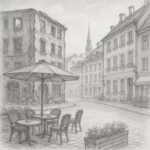I didn’t book anything in advance, as usual. That’s never been my way. I prefer to walk until my legs begin to ache, then step into the nearest hostel and ask if there’s a bed available. This time, in Turku, I was lucky again. The receptionist—a quiet Finnish woman with glacier-blue eyes—told me that Room 205 still had space. An eight-bed female dorm, but only two other women were currently staying there.
It was close to midnight when I arrived, tired and slightly disoriented. I held the key card to the door but didn’t realize there was a delay after the green light—ten seconds before the door would unlock. I stood there, confused, trying again and again. Then suddenly, a woman inside shouted loudly, something sharp and English, but muffled. She opened the door herself and looked at me with narrowed eyes—older than middle-aged, hair tied tight, voice cold. I smiled politely, said nothing, and climbed quietly to my bed.
After dropping off my things, I went to take a shower. But again—the door wouldn’t open. Same delay. The same woman came along behind me and, without a word, pushed her card into the lock, waited, and entered herself—lifting her chin with something like disdain. The door slammed behind her. I stood outside, almost laughing at myself. Eventually, I figured it out and made it in.
When I returned to the dorm, I tried to change clothes quickly and quietly. I had barely begun when the other woman sighed loudly.
“Can you turn off your reading light? It’s already midnight.”
I hadn’t even dried my hair yet. But I switched it off immediately, lay down in the dark, and tried to sleep. I thought about how dorm rooms in Northern Europe rarely have privacy curtains, and how, when you choose to sleep beside strangers, you must also accept their mood swings, their tone of voice, their fragile need for control.
Later, I would realize both of them were American, based on their accents—sharp, self-assured, accustomed to declaring discomfort aloud. But that night, I was too tired to think about anything but silence.
I woke early, long before them, and went to sit in the common lounge, hoping to read or simply enjoy the quiet. That’s when I met her—a young Asian woman who greeted me in Mandarin, assuming I was Chinese. I wasn’t, but I answered in English, and we spoke easily. She was an only child from an upper-class family in Shanghai, traveling through Europe alone. Our conversation meandered gently until, without warning, she began to cry. Loud, desperate tears, as though a dam had finally cracked.
She asked me what she should do with her life, with the situation she was facing—though I barely remember the details now. What I do remember is this:
To me, her problem felt like dust.
Like a small insect brushing your skin.
I almost wanted to laugh, not unkindly, but with a deep, exhausted understanding.
She hadn’t been through enough yet.
That’s why her pain still burned her whole.
But I had lost everything before—career, love, family, even the version of myself I once believed in. I knew what real collapse felt like. I had learned that pain isn’t something to avoid; it’s something to study. To observe.
I told her that.
That the first time life hits you, it feels unbearable.
But the second time, you recognize it.
You say to yourself, “Ah, here it comes again. The pain.”
You feel your skull tighten.
Your stomach twists.
Your hands clench.
But this time, you’re not drowning.
You’re watching the waves from the shore.
And even when they hit, you’re not surprised.
That’s what pain eventually becomes—not easier, but clearer. Like a language you learn, and eventually speak fluently, even if you’d rather not.
She listened. Her breathing slowed. Her tears stopped.
We didn’t talk for long after that. Sometimes words are enough. Sometimes silence finishes the healing better than advice.
And sometimes, the best thing we can offer another person is the reminder that they’ll survive their pain—because we did.


